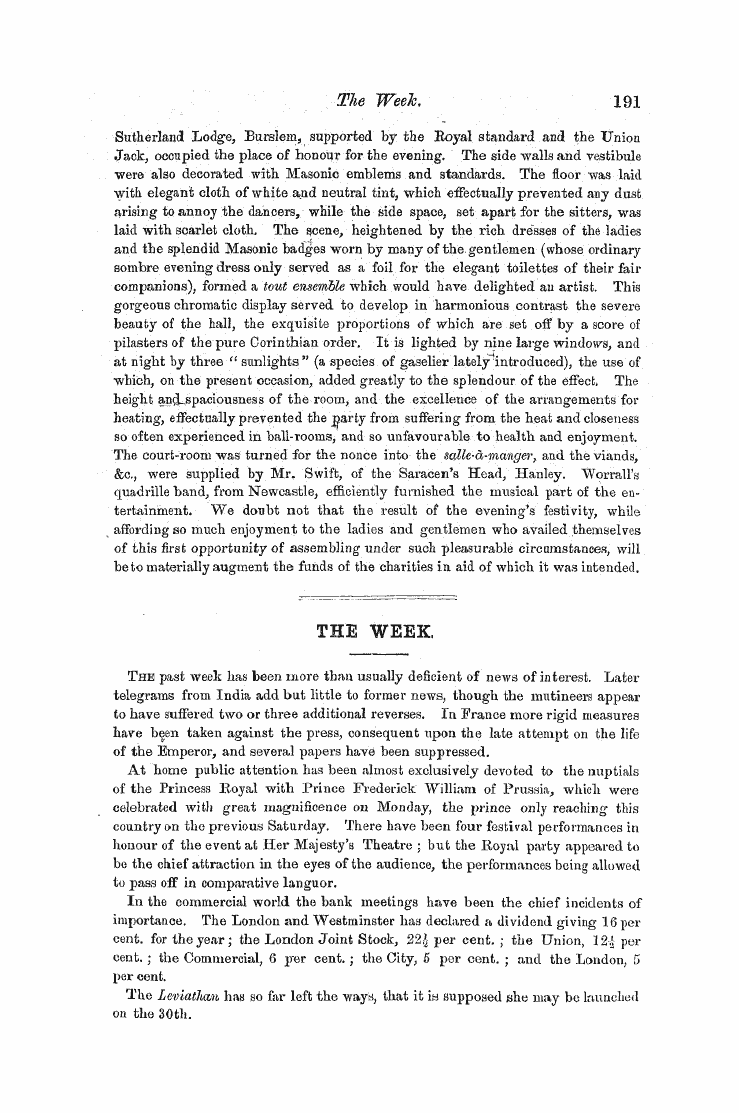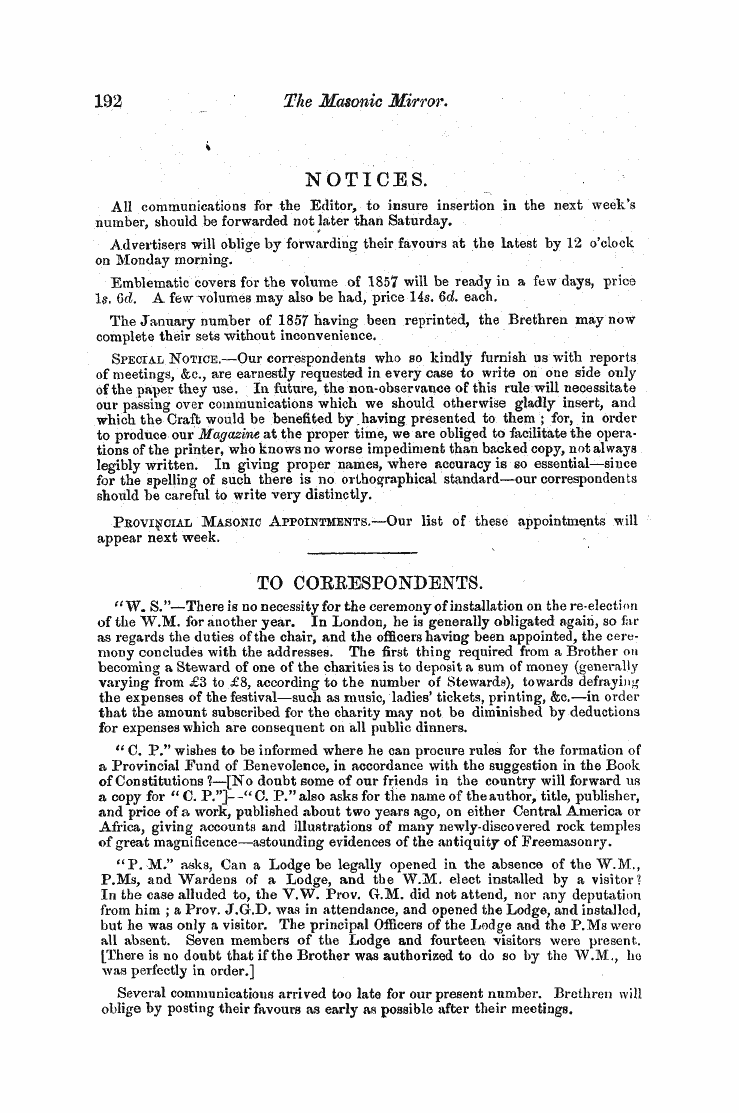-
Articles/Ads
Article MARK MASONEY. ← Page 2 of 3 →
Note: This text has been automatically extracted via Optical Character Recognition (OCR) software.
Mark Masoney.
pteyious liddge hav ^ Brethren ) who . " ;;" -. jyer : 0 - "^ li l ^ - - ¦ . ^ b ' eep ^ iie ^ irl- ¦ . : : ^ -Welvq . ; v :. ) ixfr 0 ifei ? eii > . : ¦ ¦ > . iii-- --istiliy ' ' ; w--er 0-. ; ' ^ ti ^^/ --dFor a & vanoeiiient ; but in consequence pf hiany leaving town for the Christmas holidays , only threewere in attendance ^ who w of a Mark M ^ ^ ^ Notwithstanding it was Christmas Eve , ^ members present ( who numbe ^
of the officer ^ soine of those who h ^ porarily supplied the vacancies ; so occasioned ; presaging a long lirie of skilful adepts , to whom m should wes forget the able assistance rendered to thefn and to the Bodge ^ by the Tr ^ ashrer ^ Bro . Joseph npnce ^ seemed ohly bent , as
who required it ; Aithe conclusion of t ^ newly-advanced Brethren ,- requesting them to obser ^^ evening Jbeen introduced to ad most ancient d ^^ this and other ^ countries in ail tiines past . They had it also from the testimony of old ]\ Ia ^ among them , even in ^ ejir ' pfe ^^ b ^^
lection , that the " Ma ^ '' ncient , l ? ree , and Accepted Masohry ^ - as the R . A . was of the ( Mark Mas degree ^ The B . W . M . ih elucidation of his observations ; then alluded td the ahcient degree of F . C ., which had combine qiient absence of ceremonial by the omission o it onei of purely speculative eh ^ degrees of E , j ^ . and 3 ^[ , M . t- - : - ' - : v ^^ - '' --. ; ' ;' :: -: V ' ^
Ileierrihg to the position of thfePrf ^ by the four London Bodges who had declared themselves a Grand Bodge in 1717 , the B . W , 1 Vt . said manyinnovationshad , at that period been introduced hy the Southern Masons , when separated from the mother'Lodge of York , which then was in the zenith of its power ; and from which venerable body ; he incidentally remarked , had that province derived its ceremonies and usages , now deemed peculiar by Brethren further east .
He then glanced at those proceedings of the last century , which had resulted from the constant arranging and digesting ¦ " ¦ of the Masonic system , under various Grand Masters of the south , between theyears 1717 and 1739 ; and which Preston infornied them was " on account of some innovations that had been introduced , which seemed to authorize an omission of , and a variation of the ancient ceremonies . " These innovations not only led to an unfortunate schism amongst the Brethren of the south , which lasted seventy-four yearsy but also to the complete alienation for nearly the same period , of the York , Scotch , and Irish Masons . To
the latter they were indebted for the preservation of the Mark degree , and to which they still steadily adhered . And although a better state of things was happily inaugurated by the Lodge of Promulgation in 1809 , when the Grand Lodge of England partly ( but partially ) retracing their steps , " resolved to resume the original practices of the Society ^
for the more regular diffusion of the Art , " it was much to be regretted that the 2 nd article of the Union ( Lodge of Reconciliation in 1813 ) should have been so restrictive in its nature as practically to debar the attendance of the delegates who had been invited from the two Grand Lodges of Scotland and Ireland . Thus had been lost a chance for the perfect identity of agreement and working amongst the Brethren of the three kingdoms , which time alone could satisfactorily repair *
The B . W . M . in thanking the Brethren for the attention to which they had listened to his remarks , concluded by expressing his hope , which was echoed by everyone present , that at no distant period the United Grand Lodge of England would complete the work begun in 1813 , and finally restore the Mark Degree to its proper rank in the Masonic system . Some further business having been transacted , the Lodge was closed about JO-JP . M .
Note: This text has been automatically extracted via Optical Character Recognition (OCR) software.
Mark Masoney.
pteyious liddge hav ^ Brethren ) who . " ;;" -. jyer : 0 - "^ li l ^ - - ¦ . ^ b ' eep ^ iie ^ irl- ¦ . : : ^ -Welvq . ; v :. ) ixfr 0 ifei ? eii > . : ¦ ¦ > . iii-- --istiliy ' ' ; w--er 0-. ; ' ^ ti ^^/ --dFor a & vanoeiiient ; but in consequence pf hiany leaving town for the Christmas holidays , only threewere in attendance ^ who w of a Mark M ^ ^ ^ Notwithstanding it was Christmas Eve , ^ members present ( who numbe ^
of the officer ^ soine of those who h ^ porarily supplied the vacancies ; so occasioned ; presaging a long lirie of skilful adepts , to whom m should wes forget the able assistance rendered to thefn and to the Bodge ^ by the Tr ^ ashrer ^ Bro . Joseph npnce ^ seemed ohly bent , as
who required it ; Aithe conclusion of t ^ newly-advanced Brethren ,- requesting them to obser ^^ evening Jbeen introduced to ad most ancient d ^^ this and other ^ countries in ail tiines past . They had it also from the testimony of old ]\ Ia ^ among them , even in ^ ejir ' pfe ^^ b ^^
lection , that the " Ma ^ '' ncient , l ? ree , and Accepted Masohry ^ - as the R . A . was of the ( Mark Mas degree ^ The B . W . M . ih elucidation of his observations ; then alluded td the ahcient degree of F . C ., which had combine qiient absence of ceremonial by the omission o it onei of purely speculative eh ^ degrees of E , j ^ . and 3 ^[ , M . t- - : - ' - : v ^^ - '' --. ; ' ;' :: -: V ' ^
Ileierrihg to the position of thfePrf ^ by the four London Bodges who had declared themselves a Grand Bodge in 1717 , the B . W , 1 Vt . said manyinnovationshad , at that period been introduced hy the Southern Masons , when separated from the mother'Lodge of York , which then was in the zenith of its power ; and from which venerable body ; he incidentally remarked , had that province derived its ceremonies and usages , now deemed peculiar by Brethren further east .
He then glanced at those proceedings of the last century , which had resulted from the constant arranging and digesting ¦ " ¦ of the Masonic system , under various Grand Masters of the south , between theyears 1717 and 1739 ; and which Preston infornied them was " on account of some innovations that had been introduced , which seemed to authorize an omission of , and a variation of the ancient ceremonies . " These innovations not only led to an unfortunate schism amongst the Brethren of the south , which lasted seventy-four yearsy but also to the complete alienation for nearly the same period , of the York , Scotch , and Irish Masons . To
the latter they were indebted for the preservation of the Mark degree , and to which they still steadily adhered . And although a better state of things was happily inaugurated by the Lodge of Promulgation in 1809 , when the Grand Lodge of England partly ( but partially ) retracing their steps , " resolved to resume the original practices of the Society ^
for the more regular diffusion of the Art , " it was much to be regretted that the 2 nd article of the Union ( Lodge of Reconciliation in 1813 ) should have been so restrictive in its nature as practically to debar the attendance of the delegates who had been invited from the two Grand Lodges of Scotland and Ireland . Thus had been lost a chance for the perfect identity of agreement and working amongst the Brethren of the three kingdoms , which time alone could satisfactorily repair *
The B . W . M . in thanking the Brethren for the attention to which they had listened to his remarks , concluded by expressing his hope , which was echoed by everyone present , that at no distant period the United Grand Lodge of England would complete the work begun in 1813 , and finally restore the Mark Degree to its proper rank in the Masonic system . Some further business having been transacted , the Lodge was closed about JO-JP . M .
































































































































































































